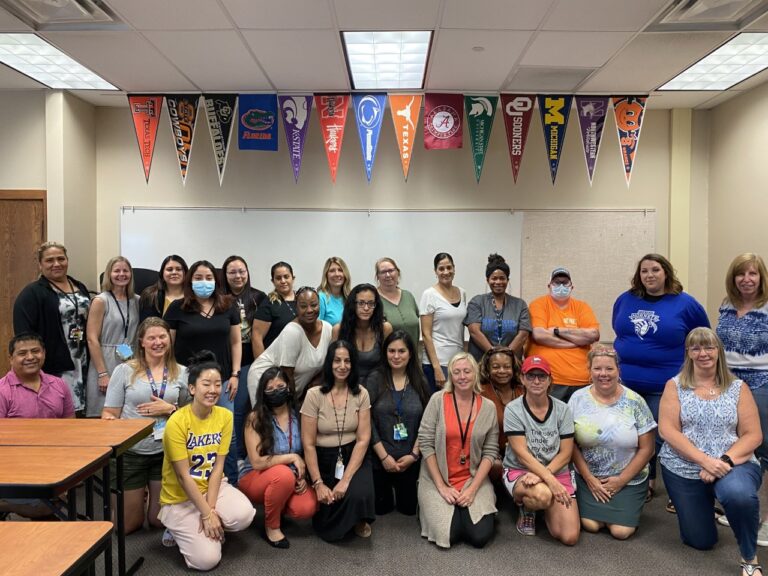ELGIN — Thousands of Illinois students with disabilities have to learn in a classroom without a special education teacher or with an educator who doesn’t have the right teaching license.
Those kids — who may have physical or cognitive disabilities — count on and are legally entitled to specially-designed instruction. Last year, Illinois school districts reported 659 unfilled special education positions.
Listen to this story here.
At Illinois’ second-largest school district — U-46 in Elgin — they’re in the midst of this same shortage. The district reported around 23 unfilled special ed positions this year.
To fix it, they’re teaming up with Northern Illinois University to train the educators who already assist those students the most: paraprofessionals. You also may also know them as teachers’ aides.
27 of its paraprofessionals are taking the leap toward a special education license through U-46 and NIU’s LEAP program. It stands for Licensed Educator Accelerated Pathway.
“We take about two years of coursework, which includes student teaching, and we compressed it into about 15 to 18 months,” said Laura Hedin, chair of the Department of Early & Special Education at NIU.
The para-educators are still working at U-46 schools so they take classes two nights a week, learn with online modules, and work with a “completion coach” who can help them with study techniques and technology since many of them haven’t been in a college classroom in decades.
Leatrice Satterwhite is the director of specialized student services at U-46. She says the pandemic has only inflamed their special ed teacher shortage.
“It’s gotten a little more challenging over the last couple of years,” she said. “That’s why we were so excited when NIU, you know, approached us about this partnership.”
Carrie Diehl is just about to start her fourth year as a paraprofessional at U-46. She got a teaching degree and taught elementary school years ago before she had kids. Now that they’re older, she felt called back into the classroom.
She’s worked as a “para” at several grade levels, including helping middle school kids with severe behavioral issues. But she’s been astonished by just how many duties paraprofessionals have.
“Kids with exceptional needs need their diapers changed. There are kids that need one-on-ones,” she said. “That could range from just being in the classroom supporting them because they have some type of physical needs or we’re in the hallway half the time because this kid can’t handle the sensory overload.”
She says it was her experience in a self-contained middle school classroom with students who needed behavioral support that motivated her to get her special education degree.
“It was a very challenging classroom.” said Diehl, “and I kept just being like, ‘gosh, I wish I could teach this. I wish I had that education.”
She’ll have classes on literacy, how to write an Individualized Education Plan for students, and how her district complies with federal disability regulations. Some of the classes are even taught by her U-46 administrators.
Satterwhite says LEAP includes clinical classroom experience on top of their classes.
“Whatever group of students that they’re learning about how to work with,” said Satterwhite, “if they [the students] have a significant cognitive disability, the district works to move that individual into the U-46 classroom that mirrors the type of student that they’re learning about to complete their field experience.”
The LEAP program began earlier this year. And the first cohort is set to graduate next year. Once they earn their degree, those 27 newly-minted special ed teachers will go to work at U-46 for at least five years.
Laura Hedin says “grow-your-own” initiatives like this are a crucial way to address teacher shortages. They can look at specific districts and specific positions that need filling.
“They know they love living in Elgin and working in Elgin because they’ve been doing it for a long time,” she said. “So, we hope that that type of program will really create lasting employees and teachers for the district.”
But at the end of the day, what really motivates Diehl is that these students deserve education and accommodations — just like any other children.
“They say, ‘oh my god, how can you do that?’ And I’m like, yes, there are days when I’ve worked with some very, very challenging kids,” she said. “But, I always come back and say, ‘these are kids.’ These are kids that just want to be like every other kid and want to be loved and understood. You have to find a way to do that for every kid, you know?”
The first LEAP students will graduate and start teaching in special education classrooms in the fall of 2023. NIU is also just beginning a similar pathway program with Rockford Public Schools.

